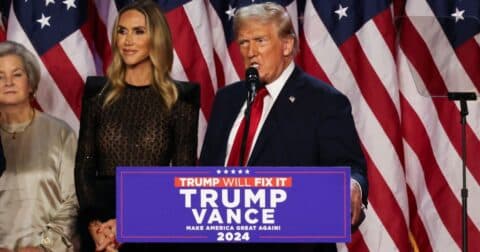News
A Major Agreement to Protect the Amazon Is Falling Apart After 20 Years
Climate•6 min read
Explainer
Trump’s win shows that misinformation is here to stay.


Words by Jessica Scott-Reid
Donald Trump has now been named the 47th president of the United States. Political analysts, news pundits and social media personalities are now arguing over the campaign postmortem. Yet one clear trend has emerged: the role of misinformation, particularly as it relates to climate change.
Conspiracy theories about weather manipulation, bans on beef and ploys to feed Americans bugs have all flourished, fueled at least in part by Russian-backed disinformation efforts. Most American voters do know that climate change is real. While 51 percent of Americans dismissed climate change as a hoax in a 2011 survey, the number decreased to 39 percent in the 2023 iteration of the poll conducted by Yale University.
Belief in climate change among Americans has outpaced skepticism, by five to one. Yet what to do about climate change — including ways to reduce emissions from the food system — is not so clear in the minds of most Americans. Seventy-four percent believe “not eating meat” would have little or no effect, according to a 2023 survey.
On top of that, when political affiliation and an upcoming election are factored in, support for climate policy action becomes a bit skewed. A Pew Research Center survey found in January that only 12 percent of Republicans and Republican leaners believe that dealing with climate change should be a top priority for the president and Congress. Alternatively, a 2023 survey, also by Pew, found that 78 percent of Democrats “describe climate change as a major threat to the country’s well-being.”
Looking back, there are clear signs that climate change misinformation played an important role in the 2024 election.
When hurricane Milton hit the state of Florida following hurricane Helene, numerous false theories proliferated on social media about what caused the disasters. The unfounded claims suggested everything from government weather manipulation to land seizures for lithium mining. High-profile figures, such as far-right Rep. Marjorie Taylor Greene, fueled these conspiracy theories, alleging that the government deliberately targeted Republican areas with weather control tactics.
Despite being widely debunked by scientists, fact-checkers and media outlets, the theories gained traction among certain groups of voters. Greene’s tweet asserting, “Yes they can control the weather. It’s ridiculous for anyone to lie and say it can’t be done,” garnered nearly 44 million views ahead of the election.
On election day, the FBI reported that Russia was linked to bogus bomb threats made at polling stations in five different states. But that was far from the first action linked to the Russian government.
During the campaign, the spread of misinformation and disinformation about climate change in the U.S. has been amplified or at least partly amplified by forces located outside the country. In September, the U.S. Department of Justice indicted two employees of RT, the Russian state-funded news outlet previously known as “Russia Today,” for paying U.S. company Tenet Media $10 million to disseminate climate misinformation through select influencers on social media.
The Russian government has taken the position that the country would benefit from climate change, in-part by rendering the Arctic more farmable, and by keeping the world reliant on fossil fuels.
According to a report by the group Climate Action Against Disinformation (CAAD), common themes among the Russian-backed posts leading up to the election included mocking climate activists, and opposing “disruptive” lifestyle changes like eating less meat. Some posts also promoted the conspiracy theory that Bill Gates is looking to replace animal farming with lab-grown meat and bug burgers. Another claimed Americans are “revolting” against UN calls for western countries to reduce meat consumption in order to meet climate targets.
Candidates Trump and Harris held notably different positions on climate change.
Harris briefly touched on transitioning from fossil fuels and green job creation, while at the same time reassuring Pennsylvania voters that she wouldn’t ban fracking. At a Wisconsin rally, she commended young voters for their leadership in tackling the climate crisis.
On the other hand, President Trump has notoriously called climate change a “hoax,” in a 2013 tweet, and again during a rally in Maine in 2016 (though he has backed off the claim and also denied being a climate denier). In 2017, Trump withdrew the U.S. from the Paris agreement, before then calling climate change “one of the greatest scams of all time” during a Pennsylvania rally this September.
Trump’s rhetoric has also occasionally shifted when talking about the potential for “clean air” and “clean water,” though he appears to remain skeptical of international agreements and policy solutions like the Green New Deal, which he has called the “green new scam.”
The Republican campaign platform did not mention climate change, and during his 2024 campaign Trump signaled his intent to dismantle existing climate regulations, and cut funding tied to the Inflation Reduction Act, which aims to reduce carbon emissions by around 40 percent by 2030. The phrase “Drill, baby, drill” remains a rallying cry among some Republicans.
When Trump-endorser Elon Musk appeared on Joe Rogan’s podcast the day before the election, he made a number of false statements about climate change, in particular denying the environmental impact of meat and dairy. “The animals are not going to make any difference to global warming. None,” he stated. “It’s not going to make any difference to global warming or CO2 concentration in the atmosphere really if people eat fewer steaks.”
In reality, animal agriculture contributes between 11 and just over 19 percent of emissions, and a wide range of researchers agree on the need for dietary change — that reducing how much meat we eat in the Global North is crucial. Yet across YouTube and Twitter, Musk’s appearance with Rogan had been viewed over 57 millions times by the morning following the election.
Worse, as recently as just days before the election, Trump referred to mainstream media as “fake news,” in this case also stating he wouldn’t mind if someone shot through journalists to get him. This undermines trust in the media in the minds of his supporters, including reporting on climate change.
“Several studies have found that one of the biggest drivers of changes in public opinion about climate change is cues from political leaders,” John Cook, an expert in the cognitive psychology of climate science denial, told Sentient. “People are tribal and respond when our tribal leaders speak.” As climate change is a topic especially vulnerable to media and political misinformation, Cook and other experts say there is a growing need for media literacy among American voters.
Despite widespread consensus on the reality of climate change, misinformation about both the causes and solutions for climate change took hold during the 2024 presidential election. As this type of misinformation continues to impact public discourse, the need for greater media literacy becomes crucial, particularly to counteract the influence of political leaders and foreign-backed campaigns on voter behavior.